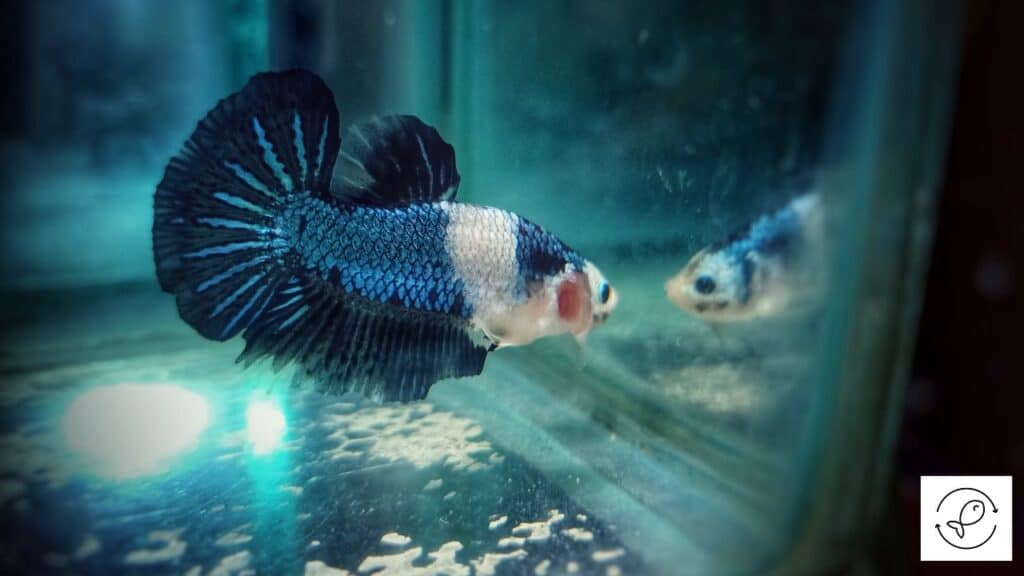Bettas need adequate sleep to stay healthy. However, excessive sleep impacts their health adversely. The main reasons bettas sleep a lot are stress, illness, cold water, boredom, and dim lighting. You can keep them active by providing favorable living conditions and stimulating activities.
Let’s now learn more about the numerous reasons that cause excessive sleeping in bettas and ways to keep them active.
Reasons Bettas Sleep a Lot
There can be several reasons why your bettas are sleeping too long.
Given below are the most prominent reasons that cause bettas to sleep excessively.
1. Cold Tank
Temperature plays a vital role in the overall growth of bettas.
A sudden and drastic change in water temperature can impact their immune function and metabolism.
Bettas being tropical fish, need warm water to thrive.
They can become lethargic if the tank water temperature is too cold or outside the desired range.
Bettas will also rest or sleep more because the temperature shock will result in slower metabolism.
As metabolism slows down, they will not have much energy to move around.
Bettas won’t be able to absorb warmth and become less active if the water is cold. So they will end up sleeping more.
2. Stress
Stress is another common reason for bettas to sleep excessively.
Bettas are pretty active and like to interact with tankmates and explore their surroundings.
However, bettas will reduce activity and prefer to sleep more under stressful living conditions.
Stress can occur due to food scarcity, poor water quality, unfavorable water parameters, fewer hiding places, incompatible tankmates, or sudden and drastic changes in the tank’s environment.
3. Conserve Energy
One more reason for bettas to sleep more is to conserve energy.
They are pretty active as they constantly swim in the tank to explore it.
Constant swimming can cause them to lose energy which leads to excessive sleeping.
They conserve energy while sleeping by slowing their heart rate and breathing.
It helps them to save energy and be active when they wake up.
4. Sickness
Sickness can cause bettas to sleep more.
If you notice that your betta is sleeping a lot even after the tank conditions are favorable, then there is a possibility that it’s sick.
You need to check for possible signs of illness, such as white spots, lumps on the skin, dropsy, fin rot, velvet disease, or other fungal or viral infections.
Early diagnosis and treatment of these diseases can help your betta fish recover faster.
5. Boredom
Boredom is a common reason for bettas to sleep more.
Bettas need plenty of physical and mental stimulation to stay active and avoid boredom.
They can also sleep if the tank is too small and has no decorations or other things to keep them interested.
Bettas like to explore their environment. So if there is nothing to do, they prefer to sleep.
6. Insufficient Lighting
Insufficient lighting in the aquarium is a significant reason for bettas to sleep more.
Bettas follow the circadian rhythm to stay healthy.
They are active during the day and rest at night when it’s dark.
If you have an insufficiently lit tank, your betta will assume it’s time to sleep and will sleep more even during the daytime.
7. Poor Water Quality

Bettas need clean water to stay healthy and active. They are susceptible to impurities in the water.
Poor water quality can stress bettas. Stress can lead to health problems and cause them to sleep more.
High ammonia levels also adversely impact their health because they lose their appetite and become sluggish.
This leads to excessive sleeping.
8. Pregnancy
Pregnancy is another reason for female bettas to sleep more than usual.
It’s because she uses more energy to produce eggs and give birth to fry.
Pregnant female bettas often require more sleep to rest their body and rejuvenate themselves.
You must ensure that pregnant female bettas get proper nutrition and adequate rest for a smooth pregnancy.
9. Old Age
Old age can cause bettas to sleep more. It’s not surprising if your bettas sleep more as they grow older.
Aging results in slow metabolism in bettas. They sleep more as they get tired quickly.
You shouldn’t worry about your old bettas sleeping excessively as long as they are having their meals regularly and aren’t sick.
10. Lazy Personality
Every fish has a different personality. Some bettas are very active, while others are a bit lazy and prefer to rest more.
You can let your bettas sleep more, but it’s equally important that they get enough exercise.
You can provide them with toys or other objects that will keep them busy and coax them to be active.
Bettas must get enough physical activity so that they don’t become obese.
Obesity can cause health issues and potentially shorten their lifespan.
How Long Do Bettas Usually Sleep?
Bettas are diurnal fish. They sleep at night when it’s dark and are active during the day.
So providing light to bettas for an appropriate duration is vital to ensure that they get adequate rest.
Bettas usually sleep around 10 to 12 hours daily.
Apart from sleeping at night, they also take infrequent short naps during the day when tired.
The amount of time bettas sleep varies depending on their personality.
Some bettas sleep frequently, while others are more active.
However, there is nothing to worry about regarding their sleeping pattern as long as they are active and eating regularly.
Adequate sleep is essential as it helps the bettas to maintain their health and well-being.
It also helps them to rejuvenate and recover from illness, stress, and other health issues.
Signs of Excessive Sleeping in Betta Fish
The activity levels of bettas can vary depending on their environment.
A betta that is newly introduced in a tank is less likely to be more active until it adjusts to its new environment.
Hence, you might notice it hiding or resting more than usual until it settles down.
However, something is wrong if you notice that your betta has been asleep too long after it has gotten used to its environment.
This can be a possible sign of illness or stress.
The betta might not eat properly and lose its appetite. It can even become lethargic and avoid moving around.
Bettas that sleep a lot also often exhibit unusual behavior, such as swimming erratically, hiding, and avoiding water movement.
A good thumb rule is to give your bettas around 12 hours of rest each day.
You need to ensure that they don’t sleep for the entire day.
You can fill their tank with some exciting things to ensure that they remain engaged and active during the day.
How to Stop Excessive Sleeping and Keep Bettas Active?
Given below are some tips to help you keep your bettas active and stop them from sleeping excessively:
- Keeping bettas stress-free can keep them active and avoid excessive sleeping. You can keep them happy by providing a conducive environment, a nutritious diet, compatible tankmates, favorable water parameters, plenty of hiding places, and good-quality water.
- Temperature shock causes bettas to sleep more as their metabolism slows down. You can install a thermometer in the tank to ensure that the water temperature remains stable and in the desired range.
- Keeping bettas healthy prevents them from sleeping excessively. A healthy betta is always active and energetic.
- Feeding your bettas regularly with a well-balanced and nutritious diet is critical for their optimal growth. They must show no signs of lethargy or sluggishness.
- Sickness and injury can cause your bettas to sleep excessively. If your bettas show any signs of illness, consult your veterinarian immediately.
- It’s essential to monitor the behavior of bettas closely. If you notice any change in the behavior of your betta, consult a professional expert immediately.
- Filling the tank with colorful ornaments or decorations, toys, objects to play with, etc., can help your bettas stay active. You can change their environment once in a while to keep them engaged. This also helps to stimulate their brain and prevent boredom.
- Adequate lighting for at least 8 to 12 hours is essential for bettas to grow and thrive. Ensure that the lights are bright enough to make your bettas feel comfortable so that they avoid sleeping during the daytime.
- Installing a filter to remove impurities from the water can help to maintain optimum water conditions for your bettas to stay healthy and remain active.

